American University of Beirut
The American University of Beirut (AUB) (Arabic: الجامعة الأمريكية في بيروت)[4] is a private, non-sectarian, and independent university chartered in New York with campus in Beirut, Lebanon.[5] AUB was ranked the top university in the Arab region in the 2018 QS World University Rankings.[6]
الجامعة الأميركيّة في بيروت | |
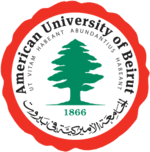 | |
Former name | Syrian Protestant College (1866-1920) |
|---|---|
| Motto | Ut vitam abundantius habeant (Latin) |
Motto in English | That they may have life and have it more abundantly[1] |
| Type | Private |
| Established | 1866 |
Academic affiliations | AACU CGS |
| Endowment | $768 million (2019)[2] |
| President | Fadlo R. Khuri, MD |
Academic staff | 1,200 instructional faculty[3] |
Administrative staff | 4,340 |
| Students | 9,408 (2019)[3] |
| Undergraduates | 7,782 (2019)[3] |
| Postgraduates | 1,626 (2019)[3] |
| Location | , 33°53′59.87″N 35°28′56.22″E |
| Campus | Urban, 61-acre (250,000 m2); and a 247-acre (1.00 km2) research farm in Beqaa Valley |
| University Press | AUB Press |
| Student Newspaper | Outlook |
| Colors | Red • White |
| Mascot | Phoenix |
| Website | www.aub.edu.lb |
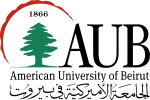 | |
AUB is governed by a private, autonomous Board of Trustees and offers programs leading to bachelor's, master's, MD and PhD degrees.
AUB has an operating budget of $423 million[7] with an endowment of approximately $768 million.[5] The campus is composed of 64 buildings, including the American University of Beirut Medical Center (AUBMC, formerly known as AUH – American University Hospital)[8] (420 beds), four libraries, three museums and seven dormitories. Almost one-fifth of AUB's students attended secondary school or university outside Lebanon before coming to AUB. AUB graduates reside in more than 120 countries worldwide. The language of instruction is English. Degrees awarded at the university are officially registered with the New York Board of Regents.
On May 5, 2020, AUB's President Fadlo Khuri announced a projected 60% decline in AUB's revenue in the next academic year and added that furloughs, layoffs, and the elimination of departments and programs will be necessary for financial survival.[9][10]
History
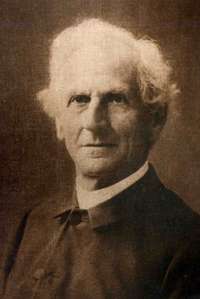
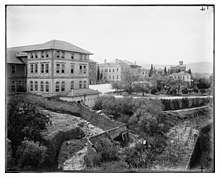
On January 23, 1862, W. M. Thomson proposed to a meeting of the American Board of Commissioners for Foreign Missions that a college of higher learning, that would include medical training, should be established in Beirut with Dr. Daniel Bliss as its president.[11] On April 24, 1863, while Bliss was raising money for the new college in the United States and England, the State of New York granted a charter for the Syrian Protestant College. The college, which was renamed the American University of Beirut in 1920, opened with a class of 16 students on December 3, 1866. Bliss served as its first president, from 1866 until 1902.[12] In the beginning Arabic was used as the language of instruction because it was the common language of the ethnic groups of the region, and prospective students needed to be fluent in Ottoman Turkish or in French as well as in English. In 1887 the language of instruction became English.[13]
AUB alumni have had a broad and significant impact on the region and the world for many years. For example, 19 AUB alumni were delegates to the signing of the United Nations Charter in 1945—more than any other university in the world. AUB graduates continue to serve in leadership positions as presidents of their countries, prime ministers, members of parliament, ambassadors, governors of central banks, presidents and deans of colleges and universities, academics, businesspeople, scientists, engineers, doctors, teachers, and nurses. They work in governments, the private sector, and in nongovernmental organizations.
During the Lebanese Civil War (1975–1990) AUB pursued various means to preserve the continuity of studies, including enrollment agreements with universities in the United States. On January 18, 1984, AUB President Malcolm H. Kerr was murdered outside his office by members of Islamic Jihad, which preceded the Hezbollah.[14] In 1982 Acting President David S. Dodge was kidnapped on campus by pro-Iranian Shiite Muslim extremists.[15][16] In 1984 and 1985 a number of university staff were kidnapped, including electrical engineering professor Frank Regier, professor J. Leigh Douglas, professor Philip Padfield, professor Joseph Cicippio, dean of the faculty of Agricultural and Food Sciences Thomas Sutherland (held captive from 1985 to 1991), director David Jacobsen, and librarian Peter Kilburn (killed by his captors).[17][18] In all, 30 university-connected people were kidnapped during the war.[15]
In November 1991, a bomb believed to have been set off by pro-Iranian Muslim fundamentalists demolished the main building of the American University of Beirut, injuring four people, on the 125th anniversary of the school's founding.[19][20]
On March 21, 2008, the Board of Trustees selected Peter Dorman to be AUB's 15th president. He succeeded John Waterbury who was president of AUB from 1998 to 2008. Dorman is a scholar in the field of Egyptology and formerly chaired the University of Chicago's Department of Near Eastern Languages and Civilizations.
On March 19, 2015, the Board of Trustees formally approved the nomination of Fadlo R. Khuri, MD,[21] as the next president. He was inaugurated as AUB's 16th president on January 25, 2016.[22]
After initially announcing that it would stay open in the face of the COVID-19 pandemic, and ignoring the Lebanese Ministry of Education and Higher Education's request that it shut down, in early March 2020 the university announced that it would close down.[23][24] AUB later announced the creation on an expert committee.[25] A research portal was also created to help in studying COVID-19 pandemic related issues.[26]
On June 15, 2020, AUB President Fadlo Khuri announced that AUB would "fire 22-25%" of its staff due to severe financial difficulties.[27]
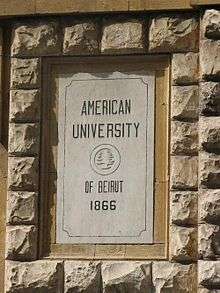
University presidents
The list of University presidents since its establishment:[28]
- Daniel Bliss (1866–1902)
- Howard S. Bliss (1902–1920)
- Bayard Dodge (1923–1948)
- Stephen B.L. Penrose, Jr. (1948–1954)
- John Paul Leonard (1957–1961)
- Norman Burns (1961–1965)
- Samuel B. Kirkwood (1965–1976)
- Harold E. Hoelscher (1977–1981)
- Malcolm H. Kerr (1981–1984)
- Calvin Plimpton (1984–1987)
- Frederic P. Herter (1987–1993)
- Robert M. Haddad (1993–1996)
- David S. Dodge (1996–1997)
- John Waterbury (1997–2008)
- Peter F. Dorman (2008–June 2015)
- Fadlo R. Khuri (September 2015–Present)
Campus
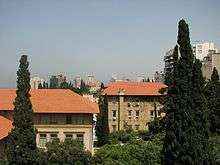
.jpg)
The 61-acre (250,000 m2) American University of Beirut campus is on a hill overlooking the Mediterranean Sea on one side and bordering Bliss Street on the other. AUB's campus in Ras Beirut consists of 64 buildings, seven dormitories and several libraries. In addition, the university also houses the Charles W. Hostler Student Center, an Archaeological Museum as well as the widely renowned Natural History Museum. Students also have a range of recreational and research facilities, such as the 247 acre research farm and educational complex hosted by the Faculty of Agricultural and Food Sciences' AREC (Advancing Research Enabling Communities Center) in Beqaa, Lebanon.[29]
Faculties
- FAFS, Faculty of Agricultural and Food Sciences[30]
- FAS, Faculty of Arts and Sciences[31]
- FHS, Faculty of Health Sciences[32]
- FM, Faculty of Medicine[33]
- HSON, Rafic Hariri School of Nursing[34]
- MSFEA, Maroun Semaan Faculty of Engineering and Architecture[35]
- OSB, Suliman S. Olayan School of Business[36]
Students
In fall 2018, there were over 9,000 students enrolled at AUB: 7,180 undergraduates and 1,922 graduate students.[37]
Research
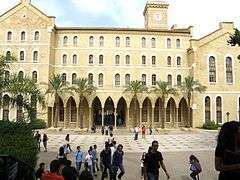
AUB offers 141 undergraduate/graduate programs and 36 certificates and diplomas. In 2007, the American University of Beirut reintroduced PhD programs. Currently, it offers doctoral programs in the following fields:[38]
- Arab and Middle Eastern History
- Arabic Language and Literature
- Biomedical Engineering
- Biomedical Sciences
- Cell and Molecular Biology
- Civil Engineering
- Electrical and Computer Engineering
- Environmental and Water Resources Engineering
- Epidemiology
- Mechanical Engineering
- Nursing
- Theoretical Physics
AUB also includes dozens of research centers and institute that sponsor and promote research in a variety of fields.[39]
Medical Center
The AUB Medical Center (AUBMC) is the private, not-for-profit teaching center of the Faculty of Medicine. AUBMC, which is accredited by the Joint Commission International (JCIA) on hospital accreditation, includes a 420-bed hospital and offers comprehensive tertiary/quaternary medical care and referral services in a wide range of specialties and medical, nursing, and paramedical training programs at the undergraduate and post-graduate levels.
Throughout its history, the AUB Medical Center, which was formerly known as the American University Hospital (AUH), has played a critical role in caring for the victims of regional and local conflicts.[40] It provided care for the sick and wounded during World War I and World War II, the Lebanese Civil War,[41] the Palestinian conflict, and the invasion of Iraq. In recent years, it has provided care for a number of Syrian refugees at the Medical Center in Beirut, at partner hospitals, and at mobile clinics.[42]
Since 1905, AUB's medical services have included a nursing school. In 2008, the American Association of Colleges of Nursing (AACN) invited AUB's Rafic Hariri School of Nursing to become a full member, making it the first member of the AACN outside the United States. The American Nurses Credentialing Center's (ANCC) Magnet Recognition Program awarded AUBMC its prestigious Magnet designation on June 23, 2009. AUBMC is the first healthcare institution in the Middle East and the third in the world outside the United States to receive this award.[43]
On April 4, 2011, AUB announced the AUBMC 2020 Vision,[44] which includes the construction of a state-of-the-art medical complex consisting of 12 buildings that would increase bed capacity to almost 600. In his inaugural address in January 2016,[45] AUB President Fadlo R. Khuri, MD, outlined Health 2025 affirming the University's commitment to be the regional leader and a key global partner in addressing global health challenges.
AUBMC now includes the Rafic Hariri School of Nursing Building, the Pierre Abu Khater Outpatient Building, the Wassef and Souad Sawwaf Building, the Medical Administration Building, the Halim and Aida Daniel Academic and Clinical Center, and the Inpatient and Outpatient hospital buildings.
The University is also home to several Clinical and Research Centers of Excellence such as the Mamdouha El-Sayed Bobst Breast Unit, the Naef K. Basile Cancer Institute, the Abu-Haidar Neuroscience Institute, the Children's Cancer Center of Lebanon (affiliated with St. Jude Children's Research Hospital in Memphis, Tennessee), the Moufid Farra Heart and Vascular Outpatient Center, the Nehme and Therese Tohme Multiple Sclerosis Center, and the Ahmad and Jamila Bizri Neuro Outpatient Center. They address health issues endemic to the Arab region such as cancer, heart and vascular diseases, diabetes, obesity, multiple sclerosis, blood disorders, and mental illness.
As part of the AUBMC 2020 vision, AUBMC held a groundbreaking ceremony for its New Medical Center Expansion Under the Patronage of HE President Michel Aoun in May 2019.[46]
University museums and collections
There are three museums at AUB: the Archaeological Museum, the Geology Museum, and the Natural History Museum.
The Archaeological Museum is the third oldest museum in the Near East. Its collection includes more than 16,000 objects and 10,000 coins and features pottery, prehistoric flint tools, bronze figurines, Phoenician and classical sculptures and bas-reliefs, Egyptian alabaster vases from Byblos, hairpins, and musical instruments. The museum has conducted excavations in Lebanon and Syria.[47] The Society of the Friends of the AUB Museum organizes lectures, exhibits, and activities for children.[48]
The Geology Museum includes rocks, minerals, and fossils from around the world.[49] It is an important resource for AUB students and researchers and for students from other universities and schools in Lebanon.
The Natural History Museum houses a unique collection that represents the biodiversity of the area.[50] It is especially well known for the Post Herbarium, which includes 63,000 specimens.[51]
AUB's Archives and Special Collections includes important documents related to the founding of the Syrian Protestant College in 1866 and also many materials (documents, maps, photographs, etc.) of interest to scholars of Lebanon and the region including the Beirut Codex,[52] a New Testament in Syriac, dating back to the 9th or 10th century; the E. W. Blatchford Collection[53] (photographs of the Middle East, Europe, and North Africa taken between 1880 and 1900); and political and cultural posters dating back to the 1940s.[54]
The American University of Beirut has embarked upon a new initiative (AUB Art Galleries and Collections) to play an active role in promoting fine and contemporary art in the region. The very first step taken in this new direction coincided with the generous donation of Dr. Samir Saleeby to AUB. The Rose and Shaheen Saleeby Collection includes paintings by artists of different generations, ranging from Khalil Saleeby (1870-1928) and Cesar Gemayal (1898-1958) to Omar Onsi (1901-1969) and Saliba Douaihy (1912-1994). It also features works by Haidar Hamaoui (b. 1937), Chucrallah Fattouh (b. 1956), and Robert Khoury (b. 1923). The Saleeby donation is the cornerstone upon which AUB will establish a comprehensive collection of modern and contemporary art from the region. The new initiative commenced with the launching of new art spaces located in and around AUB campus: the Rose and Shaheen Saleeby Museum in Sidani Street and the Byblos Bank Art Gallery, in Ada Dodge Hall (on campus).[55]
Libraries
University libraries
The university libraries include:
- Nami Jafet Memorial Library
- Engineering and Architecture Library
- Saab Medical Library[56] serves the AUB Faculty of Medicine and Medical Center, Faculty of Health Sciences, the Rafic Hariri School of Nursing, in addition to the entire AUB campus.
- Science and Agriculture Library.
The Agricultural Research and Education Center (AREC) in the Beqaa Valley also includes an annex to the Science and Agriculture Library.
The University Libraries are home to a rich collection[57] that consists of:
- Print titles: 412,775 (books); 5,776 (periodicals)
- Print volumes: 505,548 (books); 162,727 (periodicals)
- Electronic titles (including open access): 1,098,491 (books); 138,430 (periodicals)
- Databases (paid subscriptions): 262
- Print books purchased/added: 7,243 titles / 8,380 volumes
- Gift/Exchange books added: 4,136 titles / 5,048 volumes
- Manuscripts: 1,373 titles / 1,408 volumes
- Maps: 1,684 titles / 2,027 volumes
- University archives: 940 linear feet / 2,720 archival boxes
- Microform items: 11,487 titles / 33,265 volumes
- Film and video titles: 3,544 titles / 4,629 volumes
- Audio recordings: 456 titles / 740 volumes
Although many library resources are accessible remotely from on and off campus, the libraries themselves are equipped with e-classrooms, computer labs, and wireless connectivity. Trained and experienced library staff conduct classes and workshops throughout the year to introduce and train users to take advantage of the libraries' collections, information resources, and innovative technologies.
AUB Press
The American University of Beirut (AUB) has been publishing since its inception as the Syrian Protestant College (SPC). The earliest publication held in AUB's Nami Jafet Memorial Library was published in 1881; a study in Arabic on the management of disease, written by Dr. John Wortabet, professor of Anatomy and Physiology in the medical school of the Syrian Protestant College.[58]
At the time, the SPC had no university press nor a centralized publication office. The earliest publications of the college were published in the name of the college by the American Mission Press, which was founded in Malta in 1822, moved to Beirut in 1832, and operated until 1965. Other publishers produced books for AUB, including the Franciscan Press in Jerusalem and the Catholic Press in Beirut.
In 1969, a formal centralized publications office was created, the Office of Publications. By 2001, a decision was made to publish books in the name of the AUB Press rather than the more general American University of Beirut name. In 2004, organizational changes at AUB resulted in the split of the Office of University Publications into two separate offices. The Office of University Publications, which became the Office of Communications, came under the jurisdiction of the Office of Development and External Relations while the AUB Press, focused on publishing academic research as books, was placed under the jurisdiction of the Office of the Provost.
Fundraising
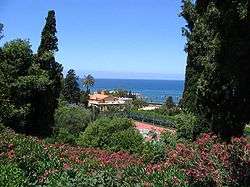
On January 16, 2017, AUB President Fadlo R. Khuri announced BOLDLY AUB: The Campaign to Lead, Innovate, and Serve[59] during an event on campus in Beirut, Lebanon.[60][61] The New York launch was on March 16, 2017.[62] The goals of the five-year $650 million Campaign are to enrich the educational and research experience of students and faculty; serve the healthcare needs of the region; prioritize innovation and entrepreneurship; engage with communities in the region to achieve real impact; and secure the University's long-term sustainability.
In January 2017, AUB also announced the largest gift in its history from the Semaan Foundation to name the Maroun Semaan Faculty of Engineering and Architecture. AUB has received major gifts in support of the BOLDLY AUB Campaign as well from the Dar Group (to design a Medical Center and develop a Campus Master Plan) and from Jamal Daniel and the Levant Foundation for an expansion of the Medical Center.[63]
Accreditation
AUB was granted institutional accreditation in June 2004 by the Commission on Higher Education of the Middle States Association of Colleges and Schools. The University's accreditation was reaffirmed in 2009 and again in 2016 and 2019.[64]
In September 2006, the Council on Education for Public Health (CEPH) accredited the Graduate Public Health Program in the Faculty of Health Sciences (FHS). The program was reaccredited in 2012 for seven years. The AUB Graduate Public Health Program is the first CEPH-accredited public health program outside the North American continent and the only CEPH-accredited public health program in the Arab world, Asia, and Africa.[65]
The Commission on Collegiate Nursing Education (CCNE) accredited AUB's Rafic Hariri School of Nursing's BSN and MSN programs on October 13, 2007. The accreditation was reaffirmed in 2012.[66]
In April 2009, the Association to Advance Collegiate Schools of Business (AACSB) accredited the Suliman S. Olayan School of Business (OSB). The accreditation was reaffirmed in 2014. AACSB is the leading international accrediting agency for undergraduate, master's, and doctoral degree programs in business administration and accounting. Less than five percent of business schools worldwide have earned AACSB International accreditation.[67]
The Maroun Semaan Faculty of Engineering and Architecture at the American University of Beirut received accreditation for its undergraduate BE civil engineering, BE computer and communications engineering, BE in electrical and computer engineering, and BE in mechanical engineering programs from the Accreditation Board of Engineering and Technology (ABET) in 2008. The accreditation was reaffirmed in 2016. The undergraduate program in chemical engineering was accredited in 2013.
The Faculty of Agricultural and Food Sciences' undergraduate Nutrition and Dietetics Coordinated Program (NDCP) was accredited by the Accreditation Council for Education in Nutrition and Dietetics (ACEND) in 2013. It was reaccredited in 2017.[68]
Notable alumni
AUB has 64,417 living alumni. They reside in more than 115 countries.[69]
AUB's “notable alumni” include the nineteen AUB graduates or former students who were delegates to the signing of the United Nations Charter in San Francisco in 1945.[70] They are listed below:
- Ted Arison (BA 1942), founder Carnival Cruise Lines, co-founder Norwegian Cruise Lines
- Angela Jurdak Khoury (BA 1937, MA 1938), member of the Lebanon delegation
- Abdul Majid Abbas (former student 1934), member of the Iraq delegation
- Ahmad Abdul Jabbar (BA 1943), member of the Saudi Arabia delegation
- Mohammad Ibrahim Adham (former student 1939), member of the Iraq delegation
- Naim Al-Antaki (former student 1924), member of the Syria delegation
- Darwish Al-Haidari (former student 1927), member of the Iraq delegation
- Fares Al-Khouri (BA 1897), member of the Syria delegation
- Nazem Al-Koudsi (former student 1920), member of the Syria delegation
- Abdul Jabbar Chalabi (former student 1926), member of the Iraq delegation
- Ghassem Ghani (MD 1919), member of the Iran delegation
- Salih Mahdi Haidar (former student 1933) member of the Iraq delegation
- Raja D. Hawrani (former student 1925), member of the Syria delegation
- Toufik Huneidi (former student 1940), member of the Syria delegation
- Fadhel Jamali (BA 1927), member of the Iraq delegation
- Hashim Jawad (BA 1932), member of the Iraq delegation
- Majid Khadduri (BA 1932), member of the Iraq delegation
- Sobhi Mahmassani (former student 1924), member of the Lebanon delegation
- Charles Habib Malik (BA 1927), member of the Lebanon delegation
- Gui Rochat (BA 1960), art dealer
- Farid Zeineddine (BA 1925), member of the Syria delegation
During its 150th celebration in 2016, the University identified a number of “History Makers” – men and women who have distinguished themselves in the areas of Leading, Innovating, and Serving by their accomplishments as scholars, politicians, artists, and in many other fields as well.[71] Excluded from consideration were current trustees, faculty, staff, and students as well as living Arab politicians. Many of these History Makers are also AUB alumni. These “notable alumni,” which included some of the people who attended the San Francisco conference in 1945, are listed below:
- Edma Abouchdid (1909–1992), physician and first Lebanese woman to complete a doctorate of medicine[72]
- Reem Acra, BBA 1982, fashion designer;
- Yusuf Aftimus (1866-1952), BA 1885, civil engineer and architect;
- Mary Ajami, (1988-1965) Journalist
- Ghada Al-Samman, MA Theater 1965, writer;
- Ismail al-Azhari (1900-1969), BS Mathematics 1930, prime minister (1954–56) and president (1965-69) of Sudan;
- Gebran Bassil (MS 1993), Leader of the Free Patriotic Movement
- Ayah Bdeir, BE Computer and Communications Engineering 2004, founder and CEO of littleBits;
- Lamia Moubayed Bissat (1988-1990), MS Agricultural Economics, civil servant, President of Institut des Finances Basil Fuleihan;
- Emile Bustani (1907-1963), BS 1929, MA 1932, member of the Lebanese Parliament;
- Huguette Caland, Former Student (1964-1968), painter and sculptor;
- Wadad Makdisi Cortas (1909-1979), BA 1930, principal of Ahliah School for Girls;
- Samih Darwazah (1930-2015), BSc Pharmacy 1954, Honorary Doctor of Humane Letters 2014, founder of Hikma Pharmaceuticals;
- Mohammed Dajani Daoudi (born 1946), Palestinian professor and peace activist
- Ali Ghandour, Former Student (1950), former CEO of Royal Jordanian Airlines;
- Ashraf Ghani (BA 1973, MA Political Studies 1977), president of Afghanistan;
- Habib Haddad, BE Computer and Communications Engineering 2002, entrepreneur and investor;
- Zaha Hadid (1950-2016), Former Student (1968-1969), Honorary Doctor of Humane Letters 2006, architect;
- George Hatem (1910-1988), MD 1931, known as Ma Haide, doctor and public health official;
- Khalil Hawi (1919-1982), BA Teaching of Arabic 1951, MA Teaching of Arabic 1955, poet;
- Habib Hazim (1920-2012), BA 1945, Patriarch of the Greek Orthodox Church of Antioch and All The East (1979-2012);
- Philip Khuri Hitti (1886-1978), BA 1908, Honorary Doctor of Humane Letters 1969, historian;
- Ray R. Irani, BS Chemistry 1953, Honorary Doctor of Humane Letters 2013, former chairman and chief executive of Occidental Petroleum Corporation;
- Malcolm H. Kerr (1931-1984), MA Middle East Area Program 1955, former AUB president, scholar of Middle East and Arab history;
- Angela Jurdak Khoury (1915-2011), BA 1937, AUB, MA 1938, Lebanese diplomat;
- Faris El Khoury (1877-1962), BA 1897, prime minister (1944–45, 1954–55), and speaker of Parliament of Syria;
- Said Khoury (1923-2014), Former Student 1940-42, 1943–44, Honorary Doctor of Humane Letters 2006, entrepreneur and philanthropist;
- Fuad Khuri (1935-2003) , Lebanese anthropologist, writer, and professor of anthropology at AUB;
- Sami Makarem (1931-2012), BA Literature and Philosophy 1954, MA Arabic Literature 1957, Lebanese scholar;
- Clovis Maksoud (1926-2016), BA 1948, diplomat and journalist;
- Charles Malik (1906-1987), BA Mathematics and Physics 1927, scholar;
- Anissa Rawdah Najjar (1913-2016), BA Sociology 1936, women's and human rights activist;
- Emily Nasrallah, BA Education 1958, writer and women's rights activist;
- Salwa Nassar (1912-1967), BA 1935, nuclear physicist;
- Zaki Nassif (1918-2004), Former Student 1936-41, composer and singer;
- Hassib Sabbagh (1920-2010), BA General 1941, Honorary Doctor of Humane Letters 2003, entrepreneur and philanthropist;
- Saeb Salam (1905-2000), Lebanese politician;
- Riad Salameh, BS Economics 1973, Lebanese banker;
- Ali Akbar Salehi, BS Physics 1971, Iranian diplomat;
- Kamal Salibi (1929-2011), BA History 1949, historian;
- Raja Shehadeh, BA English Literature 1973, writer and lawyer;
- Ghassan Tueni (1926-2012), BA 1945, Honorary Doctor of Humane Letters 2005, Lebanese journalist, politician, and statesman;
- Constantine K. Zurayk (1909-2000), BA History 1928, historian;
See also
- Alumni of the American University of Beirut
- American University (disambiguation) for a list of similarly-named institutions
- The American University in Cairo (AUC)
- American University of Sharjah (AUS)
- American University of Kurdistan (AUK)
- American University of Iraq - Sulaimani (AUI)
- Education in the Ottoman Empire
References
- https://www.biblegateway.com/passage/?search=John+10%3A10&version=NRSVCE
- As of June 30, 2019. "U.S. and Canadian Institutions Listed by Fiscal Year (FY) 2019 Endowment Market Value and Change in Endowment Market Value from FY 2018 to FY 2019". National Association of College and University Business Officers and TIAA. Retrieved February 27, 2020.
- "Facts and Figures". www.aub.edu.lb.
- "American University of Beirut". www.aub.edu.lb.
- "AMERICAN UNIVERSITY OF BEIRUT FACTS AND FIGURES 2019" (PDF).
- "American University of Beirut (AUB)". Top Universities. 2015-07-16. Retrieved 2017-09-18.
- "AUB - About Us - Facts and Figures". www.aub.edu.lb. Retrieved 2017-09-18.
- "AUBMC - American University of Beirut Medical Center". www.aubmc.org.lb.
- https://www.reuters.com/article/us-lebanon-crisis-aub/prominent-beirut-university-faces-fight-of-its-life-as-crises-hit-idUSKBN22K1RM
- https://www.thenational.ae/world/mena/lebanon-s-aub-faces-staff-cuts-and-department-closures-over-budget-crisis-1.1015857
- Dodge, Bayard (1958) The American University of Beirut – A brief history. Khayat's Beirut. p. 10
- "Rev. H. H. Jessup Dead" (PDF). The New York Times. 1910-04-29.
- Strauss, Johann. "Language and power in the late Ottoman Empire" (Chapter 7). In: Murphey, Rhoads (editor). Imperial Lineages and Legacies in the Eastern Mediterranean: Recording the Imprint of Roman, Byzantine and Ottoman Rule (Volume 18 of Birmingham Byzantine and Ottoman Studies). Routledge, 7 July 2016. ISBN 1317118448, 9781317118442. Google Books PT194.
- Farid, Farid (2016-06-16). "Steve Kerr on the Legacy of His Father's Assassination". The New Yorker. Retrieved 2020-03-18.
- "The American University of Beirut: A Year Of Tragedy and Hope"
- Betty S. Anderson. The American University of Beirut: Arab Nationalism and Liberal Education. Retrieved 2020-03-18.
- "The Released Hostages: Where Are They Now?"
- "American University Hit by Bombing". The New York Times. 1991-11-09. Retrieved 2020-03-18.
- "4 Hurt by Beirut Bomb In American University". The New York Times. Retrieved 2020-03-18.
- "AUB - 2015 - AUB appoints its 16th president, Fadlo R. Khuri, MD". website.aub.edu.lb.
- "American University of Beirut - Presidential Inauguration - Home". website.aub.edu.lb.
- "Lebanon shuts schools after fourth coronavirus case," Arab News.
- "Coronavirus: Lebanon to close schools, colleges for week | Mena". Gulf News. 2020-03-02. Retrieved 2020-03-18.
- https://www.aub.edu.lb/emergency/Pages/latest.aspx. Missing or empty
|title=(help) - https://www.aub.edu.lb/research/covid19/Pages/default.aspx. Missing or empty
|title=(help) - https://www.lorientlejour.com/article/1221941?fbclid=IwAR0gGpGewGN3JqIIo3cRNOYWcvC6HJH9_3J3UuQWtk6rtJAkzVH985uxCUs
- "History of the Office". website.aub.edu.lb. Retrieved 2 November 2019.
- "Campus". Uniandi. Archived from the original on 5 October 2013. Retrieved 30 March 2013.
- "Faculty of Agricultural and Food Sciences". www.aub.edu.lb.
- "Faculty of Arts and Sciences". www.aub.edu.lb.
- "Faculty of Health Sciences". www.aub.edu.lb.
- "Faculty of Medicine". www.aub.edu.lb.
- "Rafic Hariri School of Nursing". www.aub.edu.lb.
- "Maroun Semaan Faculty of Engineering and Architecture". www.aub.edu.lb.
- "Welcome to the Suliman S. Olayan School of Business". www.aub.edu.lb.
- "AUB website, Facts and Figures".
- "Majors and Programs". www.aub.edu.lb.
- "Research Hub". www.aub.edu.lb.
- "Tuesday, May 2, 2017". www.aub.edu.lb.
- "Aramco World, AUB - The Family Looks Ahead, January/February 1991". Archive.aramcoworld.com.
- "AUB - 2014 - Syrian refugee relief crisis evokes community-wide response at AUB". website.aub.edu.lb.
- "American University of Beirut - News - AUB Medical Center designated first". website.aub.edu.lb.
- "American University of Beirut - News - AUBMC reveals ambitious 2020 Vision for expansion and continued regional leadership". website.aub.edu.lb.
- "Presidential Inauguration Ceremony Speech" (PDF). www.aub.edu.lb. 25 January 2016. Retrieved 2019-10-11.
- "AUBMC holds a groundbreaking ceremony for its New Medical Center Expansion Under the Patronage of H.E. President Michel Aoun". AUBMC.
- "Field Work and Publications". www.aub.edu.lb.
- "Society of the Friends the Museum". www.aub.edu.lb.
- "Geology Museum". www.aub.edu.lb.
- "Natural History Museum". www.aub.edu.lb.
- "Botanical Journal of the Linnean Society, Volume 159, Issue 2, 1 February 2009, Pages 315–321". Academic.oup.com. Archived from the original on 10 October 2017. Retrieved 5 January 2018.
- "American University of Beirut, Archives and Special Collections". Aub.edu.lb. Retrieved 5 January 2018.
- "American University of Beirut, Archives and Special Collections". Web.aub.edu.lb. Retrieved 5 January 2018.
- "American University of Beirut, Archives and Special Collections". Web.aub.edu.lb. Retrieved 5 January 2018.
- "Mission". www.aub.edu.lb.
- "Home". web.aub.edu.lb.
- "Facts & Figures, 2018-2019". www.aub.edu.lb.
- ورتبات, يوحنا (1881). كفاية العوام في حفظ الصحة وتدبير الأسقام: وهو مجموع فوائد عامة تتعلق بحفظ الصحة وتدبير المرض عند غياب الطبيب [Kifāyat al-ʻawamm fī hịfẓ al-sahḥạh wa-tadbīr al-asqām]. بيروت: المدرسة السورية الكلية.
- "AUB Campaign".
- "AUB - 2017 - Boldly AUB campaign to safeguard more abundant future". website.aub.edu.lb.
- American University of Beirut (2017-01-16), BOLDLY AUB: The Campaign to Lead, Innovate, and Serve, YouTube, retrieved 2017-09-17
- "AUB – 2017 – Launch of Boldly AUB Campaign in North America". Aub.edu.lb. Archived from the original on 2017-09-17. Retrieved 2017-09-17.
- "Support for the American University of Beirut Medical Center". Thelevantfoundation.org. Retrieved 2017-09-17.
- "Accreditation and Reaccreditation". www.aub.edu.lb.
- "Faculty of Health Sciences | CEPH Accreditation". www.aub.edu.lb.
- "Accreditation". www.aub.edu.lb.
- "Archived copy". Archived from the original on 2017-10-02. Retrieved 2017-10-02.CS1 maint: archived copy as title (link)
- "Program Accreditation". www.aub.edu.lb.
- "Facts and Figures". www.aub.edu.lb.
- "AUB - 2013 - AUB remembers alumni who participated in establishment of the UN Charter in 1945". website.aub.edu.lb.
- "AUB 150th website, History Makers". 150.aub.edu.lb. Retrieved 5 January 2018.
- Windsor, Laura Lynn. (2002). Women in medicine : an encyclopedia. Santa Barbara, Calif.: ABC-CLIO. p. 3. ISBN 1-57607-393-9. OCLC 52451817.
External links
| Wikimedia Commons has media related to American University of Beirut. |